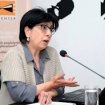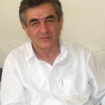The Karabakh Conflict in the Context of Political Processes in Armenia and Azerbaijan - 2018: Page 5 of 11
authorities changed frequently, they did not have the Aliyevs’ factor, who have been in power since 1994 and have completely monopolized the Karabakh issue. I mean they did not consider their approach to be the main and decisive one, they did not assure that only they were able to correctly solve the problem. In the end, if the change of power in Georgia was not a hindrance to stop the process of meetings between the parties to the conflict, in Azerbaijan the authorities, especially after Ilham Aliyev came to power, began to perceive these contacts with Armenians as "hostile" and even launched a powerful attack against those actively involved in those contacts. In fact, today this movement is completely suspended. At the same time, I. Aliyev speaks for contacts, but only with "correct Armenians", i.e. who recognize the territorial integrity of Azerbaijan. All these factors (the front line, the absence of real contacts, the monopolization of the Karabakh issue by the government) play their roles today.
Sergey Markedonov - When speaking about reconciliation with the reality, I certainly had in mind the entire foreign policy context. Internally, Pashinyan has more opportunities to expand the space for manoeuvres. At least at this stage, while his opponents are disoriented, and his popularity is great. But outside the negotiation process the new Prime Minister has no resources to "break" the existing trends. And in this regard, even if Pashinyan initiates discussions in Armenia and is involved in the negotiations process, he cannot be a revolutionary. As for Russia, its position is in principle clear. Moscow is afraid of changing anything not seeing clear prospects in how this change will work for its benefit. Will it start pedalling the special status of the NKR in the negotiations? Baku will take its counteractions, and it is a coin toss whether in the interests of Moscow or not. With the loss of influence on Georgia, it will not want to completely lose the resources of influence on Azerbaijan. There is another question belonging to a slightly different, albeit related, sphere. Most likely, issues of military-technical cooperation will be subjected to a certain correction. The experience of 2016 is too fresh, and Moscow’s perceptions of it are quite complicated. But this, I repeat myself, is a related topic, not directly connected with the negotiations. In principle, Moscow adheres to the line on the status quo. It is neither good nor bad. But in general, the policy is a reactive one.
How will the improvement of Armenia’s reputaton affect the understanding of the Armenian positions in the Karabakh conflict? And, in general, do only the countries which are rich with natural resources have the capacity to advance their positions and protect their interests?
Arif Yunusov - Liberal-democratic views are by no means a panacea for radicalism in a conflict situation, many examples from the history of the United States and Western Europe can be cited (recall the reaction of many politicians and experts of very liberal views in England to the Falkland crisis with Argentina back in its time). As







 +37410 563363
+37410 563363
 1/3 Buzand Str, 8 Floor, Yerevan, Armenia
1/3 Buzand Str, 8 Floor, Yerevan, Armenia